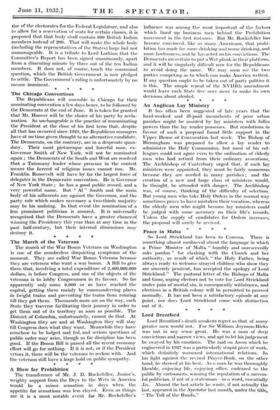An Anglican Lay Ministry It has often been suggested of
late years that the hard-worked and ill-paid incumbents of poor urban parishes might be assisted by lay ministers with fuller powers than the lay reader possesses. But resolutions in favour of such a proposal found little support in the Upper House of Convocation last week. The Bishop of Birmingham was prepared to allow a lay reader to administer the Holy Communion, but most of his col- leagues could not agree even to the ordination of elderly men who had retired from their ordinary avocations. The Archbishop of Canterbury urged that, if such lay ministers were appointed, they must be fairly numerous because they are needed in many parishes; and the creation of a new and large class of ministers would, he thought, be attended with danger. The Archbishop was, of course, thinking of the difficulty of selection. But young men who take Holy Orders in the normal way sometimes prove to have mistaken their vocation, whereas the elderly men who might become lay ministers could be judged with sonic accuracy on their life's records. Unless the supply of candidates for Orders increases, the proposal will surely be revived.


































 Previous page
Previous page